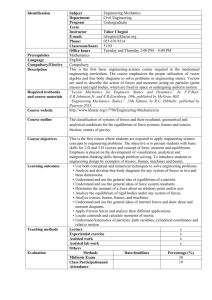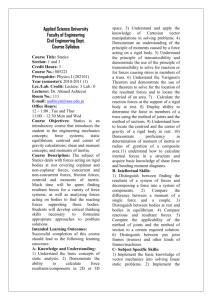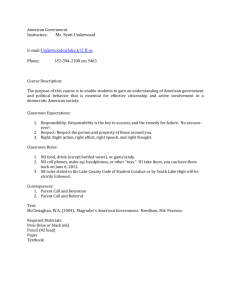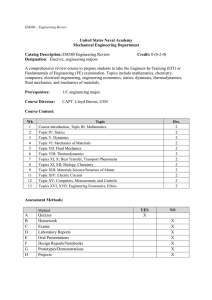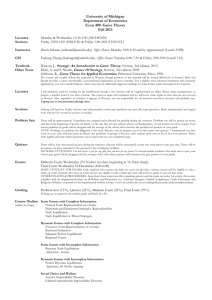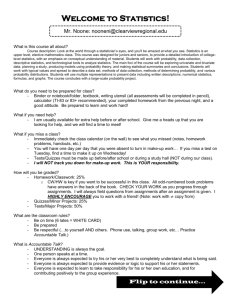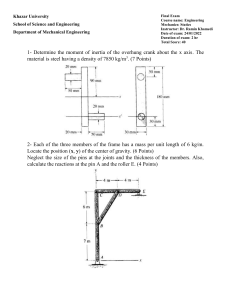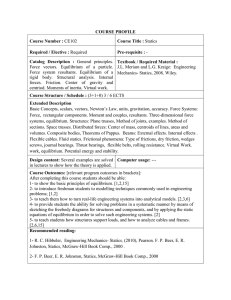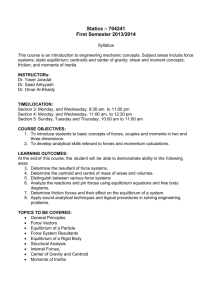Identification - Khazar University
advertisement
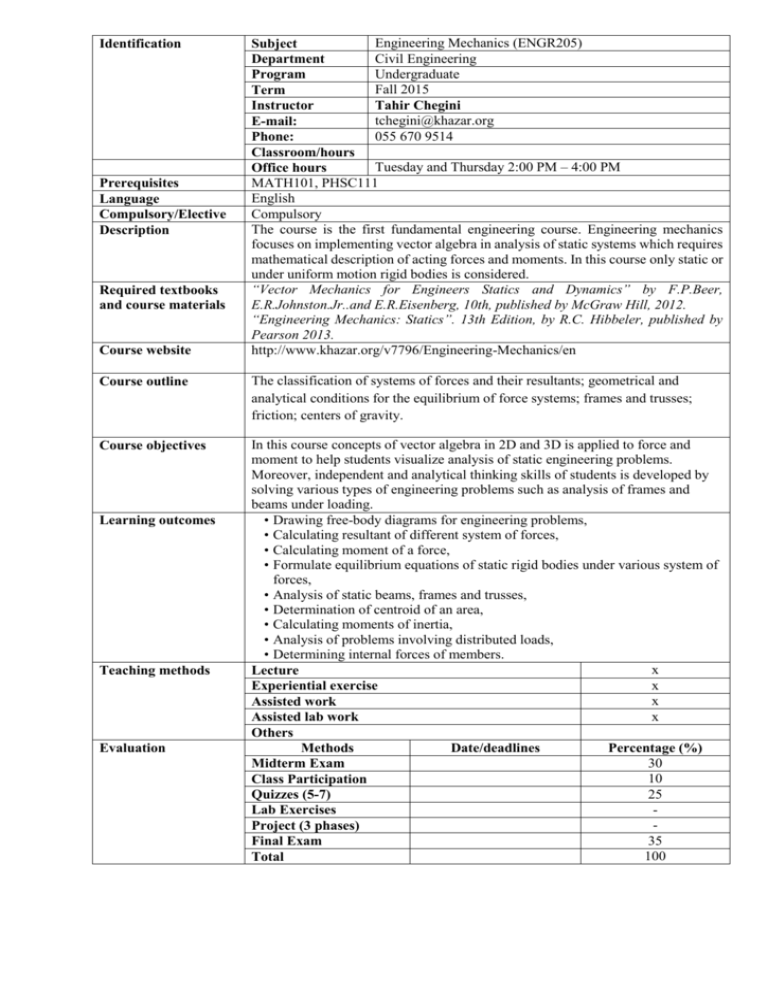
Identification Prerequisites Language Compulsory/Elective Description Required textbooks and course materials Course website Engineering Mechanics (ENGR205) Subject Civil Engineering Department Undergraduate Program Fall 2015 Term Instructor Tahir Chegini tchegini@khazar.org E-mail: 055 670 9514 Phone: Classroom/hours Tuesday and Thursday 2:00 PM – 4:00 PM Office hours MATH101, PHSC111 English Compulsory The course is the first fundamental engineering course. Engineering mechanics focuses on implementing vector algebra in analysis of static systems which requires mathematical description of acting forces and moments. In this course only static or under uniform motion rigid bodies is considered. “Vector Mechanics for Engineers Statics and Dynamics” by F.P.Beer, E.R.Johnston.Jr..and E.R.Eisenberg, 10th, published by McGraw Hill, 2012. “Engineering Mechanics: Statics”. 13th Edition, by R.C. Hibbeler, published by Pearson 2013. http://www.khazar.org/v7796/Engineering-Mechanics/en Course outline The classification of systems of forces and their resultants; geometrical and analytical conditions for the equilibrium of force systems; frames and trusses; friction; centers of gravity. Course objectives In this course concepts of vector algebra in 2D and 3D is applied to force and moment to help students visualize analysis of static engineering problems. Moreover, independent and analytical thinking skills of students is developed by solving various types of engineering problems such as analysis of frames and beams under loading. • Drawing free-body diagrams for engineering problems, • Calculating resultant of different system of forces, • Calculating moment of a force, • Formulate equilibrium equations of static rigid bodies under various system of forces, • Analysis of static beams, frames and trusses, • Determination of centroid of an area, • Calculating moments of inertia, • Analysis of problems involving distributed loads, • Determining internal forces of members. x Lecture x Experiential exercise x Assisted work x Assisted lab work Others Methods Date/deadlines Percentage (%) 30 Midterm Exam 10 Class Participation 25 Quizzes (5-7) Lab Exercises Project (3 phases) 35 Final Exam 100 Total Learning outcomes Teaching methods Evaluation Policy • NO CELL PHONES are allowed during lecture and lab sessions. PLEASE turn them off before lecture! (Not silent or vibrating mode). This is a university policy and violators will be reprimanded accordingly. • Participation and interaction in classes are more important than just attendance. • No late assignments will be accepted without prior arrangement with the instructor for acceptable excuses. Medical and family emergency will be considered on case-by-case basis. • No late homework will be accepted. Homework is to be completed on an individual basis. Students may discuss homework with classmates, but students are responsible for your own work. If students have consulted classmates, please note the individuals name on the top of students’ assignment. • Quizzes may be given unannounced throughout the term and will count as one homework. There will be no make-up quizzes. • No make-up exams. If students miss an exam, a zero score will be assigned to the missed exam. • If students should miss class due to personal emergency or medical reasons, please notify the instructor by email immediately. A doctor’s note will be required for make-up work. • Students are responsible for completing the reading assigned from the textbook related to the covered topics and for checking email regularly for important information and announcements related to the course. • University policy on academic honesty concerning exams and individual work will be strictly enforced. • BE ON TIME! Date/Day Week Topics Textbook/Assig nments Chapter 2 1 (Tentative) 15-21 Sentyabr 2 22-28 Sentyabr Vectors & Force Vectors 3 29 Sentyabr -5 Oktyabr Equilibrium of a Particle + Quiz 4 6-12 Oktyabr Moment of force 5 13-19 Oktyabr Force System Resultants + Quiz 20-26 Oktyabr Distributed Forces Chapter 4 & 5 6 27 Oktyabr 2 Noyabr Equilibrium of a Rigid Body Chapter 6 7 3-9 Noyabr Study Group No.1 Chapter 2-6 10-16 Noyabr Study Group No.1 and Midterm Chapter 2-6 9 17-23 Noyabr Introduction to Analysis of Structures + Quiz Chapter 7 10 24-30 Noyabr Method of Joints and Method of Sections Chapter 7 11 1-7 Dekabr Internal Forces Chapter 8 8-14 Dekabr Forces in cables + Quiz Chapter 8 15-21 Dekabr Study Group No.2 Chapter 7-8 14 22-28 Dekabr Study Group No.2 Chapter 7-8 15 Introduction and General Principles Chapter 2 Chapter 2 Chapter 3 Chapter3 8 12 13 Final Exam This syllabus is a guide for the course and any modifications to it will be announced in advance.
